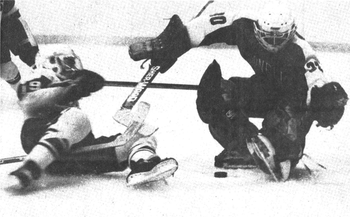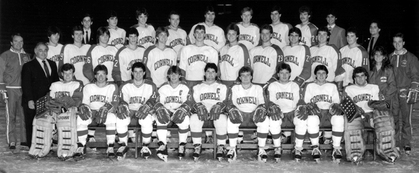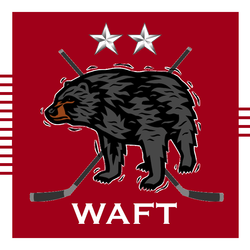Former Providence College head coach Lou Lamoriello organized the programs of the fracture and shepherded the creation of Hockey East. Hockey East crowned its first champion at the Providence Civic Center after the end of the 1984-85 season. The Friars were that champion. RPI, the 1985 ECAC Champion, defeated Providence College for the national championship in a statement win that asserted the ECAC's competitiveness and relevance on a new landscape.
Cornell was looking for a statement of its own. The seismic shifts that occurred removed key programs from the ECAC. The most dominant program in the ECAC before The Divorce was unquestionably Cornell. Cornell dominated the Conference with six ECAC Championships. Boston University had claimed only five, Harvard had three, and Boston College had two over the first 22 years of the ECAC. Would Cornell's dominance continue in the new East?
A senior defenseman and two-time captain from Durham, Ontario knew the answer to that question. He would answer it in two parts. The first would occur during this second season when he wore the C for the carnelian and red.
The Classes of 1984 and 1985 graduated without winning an ECAC Championship during their careers on East Hill. They were only the fifth and sixth graduating classes from Cornell to not claim the East's historic trophy since Cornell won its first ECAC championship. Mike Schafer, the senior defenseman captain, was determined that his class would not join those regrettable ranks. For him, winning an ECAC Championship and being a champion was the essence of Cornell hockey.
The 1985-86 team followed the lead of its zealous captain. Its goal was not to be merely ready to win the ECAC Championship. It prepared to win the 1986 ECAC Championship.
Preseason prognosticators chose Harvard as the team to win the ECAC. Most thought that Cornell would be the team in closest contention with its archrival. The defending ECAC and national champion RPI was expected to be respectable, but unlikely to repeat as either ECAC or national champion. The Crimson, Big Red, and Engineers were the expected, albeit usual suspects, to have good form when the postseason arrived. The preseason surprise out of the East was the high expectations placed on the Elis of Yale.
Lou Reycroft was handed the reins of Cornell hockey after Dick Bertrand's tenure ended in 1982. Bertrand had won two ECAC Championships over 12 seasons. The 1985-86 season was Reycroft's fourth as head coach. Cornell had missed the playoffs in his first two seasons and was eliminated in the 1985 ECAC Championship Semifinals. The 1985-86 edition of the Big Red team and he were ready to do much better.
The benchmarks of the season would be contests against the much-praised Crimson of Harvard, Engineers of RPI, and Elis of Yale. Cornell suffered an early season Ivy-League loss to Princeton in November. The Big Red held a 4-1-2 record when it was set to host archrival Harvard on December 8, 1985.
What is remembered about that game is less the score than the animosity. It was the game during which Mike Schafer shot a puck at Harvard head coach Bill Cleary on the bench for Cleary's usual Cornell-Harvard game antics and the Crimson's conduct in the game. Cleary, in what had continued to be almost tradition, refused to shake the hands of the Red skaters after the game. Captain Schafer took exception to that as well. Tempers flared and Cornell ended the game frustrated with a losing tally of 11-3 to its archrival.
Cornell and Yale attended the 1986 Thunderbird Centennial Classic in Vancouver, British Columbia in January. Cornell defeated teams from the University of British Columbia and Kokudo Keikaku Ice Hockey Club. Cornell and Yale were the last teams remaining. They met January 5, 1985. Cornell defeated the Bulldogs 5-3. The next barometer of success would be a game against RPI five days later.
Lynah Rink was the meeting place of Cornell and RPI for their first regular-season meeting in the 1985-86 season. Not long before, Cornell had seemed invincible within those hallowed walls. It would not be so that day. Talented forwards and offensively minded defensemen including Joe Nieuwendyk, Peter Natyshak, Duanne Moeser, Chris Norton, and Mike Schafer were held silent in front of the Lynah Faithful. The Engineers were unsolvable to the home-standing Cornell. The visitors won 3-0.
Cornell had registered a mark of 1-2-0 against the ECAC programs expected to be the most nationally relevant. The Big Red looked to rebound in a big way at Ingalls Rink. Cornell would rebound in spectacular fashion. Cornell trounced the offense-first Elis 6-3 in New Haven. The game was never in question. The flow of the game was set and typified when Dave Hunter of Cornell dumped the puck in the Bulldogs's zone and converted. Yale head coach Tim Taylor referred to the weekend as "the most disappointing weekend in Yale hockey in five years."
The playoffs loomed on the horizon. Harvard hosted Cornell on Valentine's Day 1986, but no love would be lost between the two teams. Cornell thirsted for revenge against Harvard. The Harvard Crimson reported gleefully that Cornell's point total in the ECAC had the Big Red barely clinging to the fourth and final spot to host a playoff series in the 1986 ECAC Tournament. Cornell had not lost a conference road game headed into the second clash between the archrivals.
Cornell's streak of road success would snap. Harvard jumped out to a 3-2 lead early in the second period. Cornell would find the equalizer more than halfway through the third. The Crimson would benefit from a power-play opportunity in overtime. The Cantabs's Lane MacDonald would convert giving Harvard its first sweep of Cornell since the 1981-82 season.
The strategic and psychological advantage of hosting a playoff game at Lynah Rink hung in the balance. The 1985-86 squad that began the season knowing that it would win the 1986 ECAC Championship was deflated. It no longer knew if it would begin its playoff quest at home. The team pondered if it would be required to do what the 1980 ECAC Champion squad needed to do.
Key contests against Yale and RPI remained. Over that span Cornell defeated Dartmouth, Brown, and Vermont by an 18-5 combined margin. The Big Red suffered its first loss to the Elis of Yale in the three regular-season meetings of the teams. Three second-period goals had given the Bulldogs a sizable lead. Dave Hunter whittled Yale’s advantage to a 3-2 disparity by the end of the second period.
Cornell was resolute not to fall to a 0.500 record in their proud building. A loss to Yale would result in such a stumble. Andy Craig found the equalizer for the home team in the third period. Could Cornell seize victory from the predatory jaws of defeat? Joe Nieuwendyk blasted a shot past Yale’s Schwalb for the go-ahead marker. Tim Taylor’s team responded less than two minutes later.
The Bulldogs escaped Lynah Rink with a 5-4 overtime win. A 4-4-3 record represented Cornell’s performance on East Hill after the overtime loss. Cornell responded with a victory over Brown the next evening to improve marginally a disappointingly mean record in the hallowed building. The Big Red wrapped up the season against RPI at Houston Field House.
The Engineers controlled a commanding 4-1 lead early in the second period of play. Cornell was determined to win in front of the carnelian-loathing and cherry-loving crowd. The gap shrunk to a 5-3 deficit by the end of the second frame. Cornell tied the game to send it into overtime with just over two minutes remaining in the ultimate regular-season game of the 1985-86 season.
It took nearly six and a half minutes but captain Peter Natyshak solved RPI's Jopling for the seventh and game-ending time. Cornell's Chris Morton chipped in four points, Duanne Moeser earned a hat trick, Joe Nieuwendyk tallied three points, and Mark Canduro and Mike Schafer recorded two points in a very important 7-6 win. Reycroft remarked that the game "helped our self-image at this time of the season because it was an uphill battle."
Cornell lost only once on the road during the regular season. Ironically, this performance secured Cornell the right to begin its 1986 playoff run at Lynah Rink. Cornell had gone 4-1-0 since a loss to Harvard. Cornell had produced a disappointing combined record of 3-4-0 against Harvard, RPI, and Yale. Cornell had lost only two other games during the regular season.
The season did not unfold as captain Mike Schafer had hoped. Schafer could not abide allowing Bill Cleary to record his third regular-season sweep of Cornell during Schafer’s senior campaign. These losses motivated Cornell. A championship was the only thing that could salve the disgust at suffering a sweep at the hands of Harvard. Winning now would allow the 1985-86 team to prove something to itself in addition to reaffirming a truth about the program it represented.
Cornell would begin its playoff quest against Vermont while Harvard hosted Colgate, Yale hosted St. Lawrence, and RPI hosted Clarkson. Vermont was a team that was not flush with talent but it would never self-destruct according to Reycroft. It would be a challenge.
The ECAC adopted a playoff format in 1983 that instituted series for the quarterfinals of the ECAC Tournament. A team that won and tied the first two games would advance. If the first two games of the series resulted in a split, a third mini game would be played under this format. Cornell had missed the playoffs in 1983 and 1984 under this regime. The 1985 playoffs saw Cornell win its first postseason series in the 1985 ECAC Quarterfinals. The Big Red eliminated Yale with two wins in 1985.
The first game went as many coaches around the ECAC expected. Cornell dominated Vermont in front of the Lynah Faithful. Cornell won the first game 8-3. However, the Catamounts were not content to go quietly. The second game of the 1986 ECAC Quarterfinals between Cornell and Vermont required an extra frame. The game would end in a tie. Cornell would advance to Boston Garden for the second time in as many years with a win and a tie against Vermont.
Cornell, Harvard, and Yale advanced out of the 1986 ECAC Quarterfinals. RPI suffered a sweep at the hands of rival Clarkson. Cornell's first opponent at Boston Garden would be the Bulldogs of Yale. Yale, the oldest collegiate hockey program in the nation, entered Boston Garden riding an emotional high. Yale's wins over St. Lawrence in the 1986 ECAC Quarterfinals were Yale's first playoff wins in program history.
Yale's offense was clicking at an astounding rate heading into the Bulldog's first appearance in the ECAC Championship Semifinals. Cornell's defense had begun to display its characteristic poise and discipline. The March 14, 1986 game was destined to be a clash of the philosophies of Cornell and Yale hockey.
The high-octane offense of the Yale squad allowed the Bulldogs to jump out to an early lead. Cornell's resolute defense held the Bulldogs to just one goal through the first frame. Yale learned early that Cornell's defense and Doug Dadswell had come to honor the Cornell tradition of winning the historic crown of the East. It would take more than fast-paced play and finesse to deny these Red skaters. Yale had outshot Cornell by a ratio of two to one. Cornell's offense returned to the ice for the second period with new focus.
Cornell would need to generate offense. It was becoming apparent to even the Lynah Faithful that Cornell's defense could not weather the Yale Blue onslaught indefinitely and that it was quickly becoming Dadswell against the Elis's offense. The Red response put pressure on the Bulldogs to win the game.
Cornell scored twice in the first ten minutes of the 1986 ECAC Championship Semifinal game. Alan Tigert took a long wrist shot that bested a screened Mike Schwalb for the Bulldogs. The second goal would be far less finesse and much more grit. Chris Grenier deposited the puck into Yale's net after a flurry in front of Schwalb left the puck lying on the crease. Yale needed to rebut the sudden offensive outburst from the Big Red.
Tim Taylor's team found the equalizer before the second period expired. The teams reemerged from their locker rooms for the third period. Schwalb and Dadswell engaged in a goalie duel. It was the latter who had greater opportunities for demonstration. Tim Taylor of Yale and his players began to grow obviously frustrated with the elevated play of Dadswell. The Cornell netminder seemed to get better with each subsequent Yale challenge. Cornell would enter overtime for the second time in the 1986 ECAC Tournament.
The minutes of the first overtime ticked away. Sophomore forward Joe Nieuwendyk was called for a penalty in the final minutes of the first overtime. Fewer minutes remained in the period than the penalty he would serve. Yale's power-play unit had been thwarted and frustrated since the first period.
Cornell earned its respite with killing off the minutes of Nieuwendyk's penalty in the first overtime. The Big Red would take the ice still needing to kill time off the residuary of that penalty. Cornell killed off the penalty. The phenomenal sophomore forward rushed from the box, received the puck behind Yale's net, and connected beautifully to an onrushing Duanne Moeser. Moeser made Cornell's 33rd shot of the 1986 ECAC Championship Semifinal count as he eliminated the Bulldogs.
Yale had lobbed 59 challenges at Dadswell. The Big Red netminder was equal to 57 of them. Yalie Dave Baseggio remarked that "frustration was the only word to describe it." Dadswell commented after the first game at Boston Garden that "by the end of the game, I didn't know how much longer I could go on." His stellar performance gave Cornell its first berth to the ECAC Championship game in five years.
Cornell was the last favorite standing. RPI fell. Yale withered. Harvard collapsed. None of the favorites remained to challenge the Big Red. The 1986 ECAC Championship Final would pit Cornell against Clarkson. It was the third meeting of the Big Red and the Golden Knights in the ECAC Championship Final. The two had split the previous meetings.
Cornell wasted no time in letting its intentions be known. Clarkson found itself down by two goals early in the second period. The Golden Knights were not shy in showing that they wanted to win the ECAC Championship 20 years after they had won their first and only ECAC Championship to date. The Golden Knights tied the game on two power-play goals including a five-on-three opportunity.
The 1986 ECAC Championship Final would not continue without its controversy. Cornell's Dave Crombeen found the back of Clarkson's net in the third period. The goal was nullified after official consultation determined that Crombeen attained the goal from a hand pass. The game remained stalemated for regulation. The Red skaters and Dadswell prepared for Cornell's third overtime game in a four-game playoff run.
Cornell had not lost either of the previous overtime games in the 1986 ECAC Tournament. The players were determined that they would not be denied their goal of winning Cornell's seventh ECAC Championship. An entire overtime frame would be unnecessary. The Big Red's Chris Greiner beat Clarkson's Falle at 8:26 of the first overtime.
The Lynah Faithful erupted. Lou Reycroft was handed a championship trophy for the first time as head coach of Cornell during his fourth season. The Class of 1986 including captains Duanne Moeser, Peter Natyshak, and Mike Schafer had achieved its goal. Its bringing of another championship to East Hill honored the tradition of Cornell hockey. It would be far from the last championship that Mike Schafer gave Cornell.
Cornell outscored its opponents 17 goals to ten goals during the 1986 ECAC Tournament. Chris Greiner found the back of the net in overtime for Cornell's championship-clinching goal against Clarkson's goaltender, Jamie Falle. Doug Dadswell produced a goals-against average of 2.50 and a save percentage of 0.928 over the course of the 1986 ECAC Tournament. Cornell hoisted its first ECAC Championship in the post-Divorce era that evening on March 15, 1986 at Boston Garden.
Mark Canduro, Andy Craig, Dave Crombeen, Doug Dadswell (G), Craig Donovan, Keith Donovan, Jim Edmands (G), Chris Grenier, Pat Heaphy, Keith Howie, Dave Hunter, Tom Jackson, Rob Levasseur, Mark Major, Pete Marcov,
Darin McInnis (G), Mike Moberg, Duanne Moeser (C), Peter Natyshak (C), Chris Norton, Joe Nieuwendyk, John Parry,
Mike Schafer (C), Dave Shippel, Stewart Smith, Darren Snyder, Alan Tigert
- Navigate the Rafters -










 RSS Feed
RSS Feed
